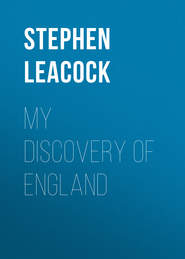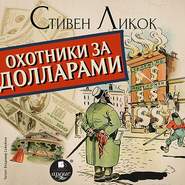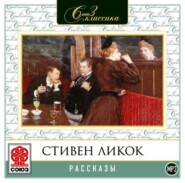По всем вопросам обращайтесь на: info@litportal.ru
(©) 2003-2024.
✖
Behind the Beyond, and Other Contributions to Human Knowledge
Автор
Год написания книги
2019
Настройки чтения
Размер шрифта
Высота строк
Поля
I started to do so.
"Close it," he added quickly.
Then he looked again.
"The ears are bad," he said; "droop them a little more. Thank you. Now the eyes. Roll them in under the lids. Put the hands on the knees, please, and turn the face just a little upward. Yes, that's better. Now just expand the lungs! So! And hump the neck—that's it—and just contract the waist—ha!—and twist the hip up toward the elbow—now! I still don't quite like the face, it's just a trifle too full, but–"
I swung myself round on the stool.
"Stop," I said with emotion but, I think, with dignity. "This face is my face. It is not yours, it is mine. I've lived with it for forty years and I know its faults. I know it's out of drawing. I know it wasn't made for me, but it's my face, the only one I have—" I was conscious of a break in my voice but I went on—"such as it is, I've learned to love it. And this is my mouth, not yours. These ears are mine, and if your machine is too narrow—" Here I started to rise from the seat.
Snick!
The photographer had pulled a string. The photograph taken. I could see the machine still staggering from the shock.
"I think," said the photographer, pursing his lips in a pleased smile, "that I caught the features just in a moment of animation."
"So!" I said bitingly,—"features, eh? You didn't think I could animate them, I suppose? But let me see the picture."
"Oh, there's nothing to see yet," he said, "I have to develop the negative first. Come back on Saturday and I'll let you see a proof of it."
On Saturday I went back.
The photographer beckoned me in. I thought he seemed quieter and graver than before. I think, too, there was a certain pride in his manner.
He unfolded the proof of a large photograph, and we both looked at it in silence.
"Is it me?" I asked.
"Yes," he said quietly, "it is you," and we went on looking at it.
"The eyes," I said hesitatingly, "don't look very much like mine."
"Oh, no," he answered, "I've retouched them. They come out splendidly, don't they?"
"Fine," I said, "but surely my eyebrows are not like that?"
"No," said the photographer, with a momentary glance at my face, "the eyebrows are removed. We have a process now—the Delphide—for putting in new ones. You'll notice here where we've applied it to carry the hair away from the brow. I don't like the hair low on the skull."
"Oh, you don't, don't you?" I said.
"No," he went on, "I don't care for it. I like to get the hair clear back to the superficies and make out a new brow line."
"What about the mouth?" I said with a bitterness that was lost on the photographer; "is that mine?"
"It's adjusted a little," he said, "yours is too low. I found I couldn't use it."
"The ears, though," I said, "strike me as a good likeness; they're just like mine."
"Yes," said the photographer thoughtfully, "that's so; but I can fix that all right in the print. We have a process now—the Sulphide—for removing the ears entirely. I'll see if–"
"Listen!" I interrupted, drawing myself up and animating my features to their full extent and speaking with a withering scorn that should have blasted the man on the spot. "Listen! I came here for a photograph—a picture—something which (mad though it seems) would have looked like me. I wanted something that would depict my face as Heaven gave it to me, humble though the gift may have been. I wanted something that my friends might keep after my death, to reconcile them to my loss. It seems that I was mistaken. What I wanted is no longer done. Go on, then, with your brutal work. Take your negative, or whatever it is you call it,—dip it in sulphide, bromide, oxide, cowhide,—anything you like,—remove the eyes, correct the mouth, adjust the face, restore the lips, reanimate the necktie and reconstruct the waistcoat. Coat it with an inch of gloss, shade it, emboss it, gild it, till even you acknowledge that it is finished. Then when you have done all that—keep it for yourself and your friends. They may value it. To me it is but a worthless bauble."
I broke into tears and left.
II.—The Dentist and the Gas
"I THINK," said the dentist, stepping outside again, "I'd better give you gas."
Then he moved aside and hummed an air from a light opera while he mixed up cement.
I sat up in my shroud.
"Gas!" I said.
"Yes," he repeated, "gas, or else ether or a sulphuric anesthetic, or else beat you into insensibility with a club, or give you three thousand bolts of electricity."
These may not have been his exact words. But they convey the feeling of them very nicely.
I could see the light of primitive criminality shining behind the man's spectacles.
And to think that this was my fault—the result of my own reckless neglect. I had grown so used to sitting back dozing in my shroud in the dentist's chair, listening to the twittering of the birds outside, my eyes closed in the sweet half sleep of perfect security, that the old apprehensiveness and mental agony had practically all gone.
He didn't hurt me, and I knew it.
I had grown—I know it sounds mad—almost to like him.
For a time I had kept up the appearance of being hurt every few minutes, just as a precaution. Then even that had ceased and I had dropped into vainglorious apathy.
It was this, of course, which had infuriated the dentist. He meant to reassert his power. He knew that nothing but gas could rouse me out of my lethargy and he meant to apply it—either gas or some other powerful pain stimulant.
So, as soon as he said "gas," my senses were alert in a moment.
"When are you going to do it?" I said in horror.
"Right now, if you like," he answered.
His eyes were glittering with what the Germans call Blutlust. All dentists have it.
I could see that if I took my eye off him for a moment he might spring at me, gas in hand, and throttle me.
"No, not now, I can't stay now," I said, "I have an appointment, a whole lot of appointments, urgent ones, the most urgent I ever had." I was unfastening my shroud as I spoke.
"Well, then, to-morrow," said the dentist.
"No," I said, "to-morrow is Saturday. And Saturday is a day when I simply can't take gas. If I take gas, even the least bit of gas on a Saturday, I find it's misunderstood–"
"Monday then."
Другие электронные книги автора Стивен Батлер Ликок
Другие аудиокниги автора Стивен Батлер Ликок
Рассказы




 4.67
4.67













